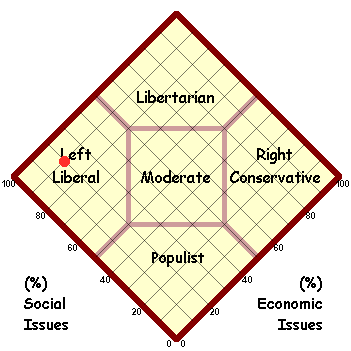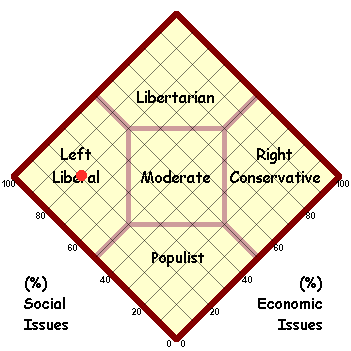
Posted on 02/14/2008 8:49:07 AM PST by forkinsocket
You can't read a story about John McCain without seeing the word "maverick." But is it true?
Now that John McCain is the all-but-certain Republican nominee for president, there is one thing we know for sure about how the general election will play out: The Democrat is going to be at a serious disadvantage in the media. This will be true even if that nominee is Barack Obama, who has gotten better coverage thus far than Hillary Clinton. Reporters find his candidacy a compelling story, but that attraction has its limitations. When it comes to John McCain, however, it's pure love.
The issue of the media's affection for McCain is a complex one that I'll be exploring in detail over the coming months. But for the moment, let's take a look at perhaps the most prominent and repeated element of the mythology surrounding the Arizona senator.
If you asked 100 reporters what one word they would use to describe John McCain, 99 would probably answer, "maverick." Indeed, they've become so used to attaching "maverick" to McCain that it has become almost a part of his name; "the maverick John McCain" is used in the same way we refer to "Panamanian strongman Manuel Noriega" or "teen sensation Hannah Montana." A Lexis-Nexis search reveals that in the month of January alone, McCain was referred to in the media as a "maverick" more than 800 times. Pick up today's newspaper or turn on cable news, and you won't have to wait long before a reporter or pundit calls McCain a maverick.
But is John McCain really a maverick? A look beyond the media's repetition of the word at McCain's actual record suggests that the answer is no. In fact, McCain is a reliable conservative, and if not a perfectly loyal Republican, at least a reasonably loyal one.
According to Congressional Quarterly's party unity scores, which track how often members of Congress side with their party on key votes, over the course of his career McCain has voted with his party 84 percent of the time—not the highest score in the Senate but hardly evidence of a great deal of independence. Similarly, the American Conservative Union gives McCain a lifetime rating of 82.3, making him a solid friend of the right's. And according to the widely respected Poole-Rosenthal rankings, McCain was the eighth-most conservative senator in the 110th Senate.
This may come as a surprise to some. After all, few reports about McCain will fail to mention his fights with members of his own party, leaving the impression that he isn't much of a Republican at all. McCain does vote with the Democrats on rare occasions, but the fact is that virtually every member of Congress breaks with his or her party now and then. So why are McCain's disagreements given so much more attention?
Journalists who attach the label "maverick" to McCain might say that it isn't the quantity of McCain's breaks with the GOP that matters, but the quality. He championed campaign finance reform and supported FDA regulation of tobacco. He sponsored a bill to address climate change. In other words, while others in the Senate break with their party far more often than McCain, his acts of apostasy are "high profile." Indeed they are, but we should be careful not to confuse cause with effect. McCain's breaks with the GOP are "high profile" precisely because the press is so eager to paint him as a maverick and rewrite a story with which they are well familiar.
Here's how it usually works. Imagine that the Democrats and Republicans have a conflict over a piece of legislation, and on both sides, party unity is fairly strong. Only a couple of senators—let's say Democrat Ben Nelson of Nebraska, and Republican Olympia Snowe of Maine, two centrists—have decided to break with their respective parties and join the other side. Reporters will find the positions taken by these two unremarkable, since Nelson and Snowe have crossed the aisle many times before (their party unity scores are regularly in the 50s, compared to McCain's 84). The news stories that follow will still describe the story as a clash between the two parties, and Nelson and Snowe will be footnotes at best, bit players in the drama whose actions don't change the underlying news narrative.
But if John McCain decides that he will join Snowe and side with the Democrats, the story being written in the media undergoes a dramatic shift. It now becomes not a story about a conflict between the Democrats and the Republicans, but a story about a conflict between John McCain and the Republicans. He instantly becomes the lead actor in the tale, as Democrats fade into the background. His name will be in the headlines, and every article about the topic will include quotes from McCain, reminders of past breaks with his party, a quote from a representative of a conservative interest group attacking McCain, and stirring descriptions of the Arizona senator's courageous independence, political consequences be damned.
A comparison might be useful. Over her time in the Senate, Hillary Clinton has voted with Republicans on any number of occasions. On several key issues, she is more centrist than most of her party—she supports the death penalty, she was a longtime advocate of NAFTA, and she is more hawkish on foreign affairs than most Democrats. Furthermore, if reporters wanted to, they could find plenty of officials from Washington-based progressive groups who would offer critical quotes of her position on a given issue as insufficiently loyal to progressive principles. Yet if a reporter referred to Hillary Clinton as a "maverick," his colleagues would laugh him out of town.
There is one other key factor to understand in the making of the "maverick" myth. Look at the times when McCain has differed with his Republican colleagues, and what you find is that in almost every case, the position held by most in the GOP was broadly unpopular with the public. Campaign finance reform, regulation of tobacco, even the Bush tax cuts (to which the public was indifferent and which McCain could hardly support, having criticized them as Bush's opponent in the 2000 presidential race)—in every case, the position McCain took put him on the right side of public opinion. So what the press calls "maverick" stands could just as easily be interpreted as highly political efforts to maintain McCain's strong popularity with the general public. For someone whose goal was to gain sufficient affection among his colleagues to rise to become his party's leader in the Senate, these would be unwise moves. But McCain never demonstrated any interest in a position in the Senate leadership—his sights were set higher.
Much of presidential campaign coverage is about "character"—who the candidates really are deep down, beyond their position papers and television ads. Reporters decided long ago that John McCain's character is of a higher order than ordinary mortals. In their telling, his motives are pure, his every word and deed speaks of unrivaled courage, and his fierce independence makes him a "maverick." Everything McCain does is either highlighted or ignored based on whether it fits this pre-existing portrait. So when McCain lards his campaign with lobbyists and GOP insiders, as he did in its initial formation, or when he genuflects before religious radicals like Jerry Falwell and John Hagee, reporters dismiss it as a momentary aberration not representing the real John McCain.
So too with the perennial topic of flip-flops. When he ran for president in 2000, McCain decided to skip the Iowa caucus, and noted his opposition to heavy government subsidies of ethanol, made from Iowa corn (a topic of frequent presidential candidate pandering). But in the current campaign, McCain did contest the Iowa caucuses, and by an extraordinary coincidence changed his position on ethanol 180 degrees. Had it been another candidate—Mitt Romney or John Kerry, for instance—reporters would have presented the flip-flop as revealing of the candidate's character, a window into his cynical, pandering soul. But not when the flopper is John McCain. Nor has he been criticized by pundits for his turnaround on immigration; after receiving criticism for his support of President Bush's comprehensive immigration reform, in recent months McCain became a convert to the gospel of border security, emphasizing to the GOP faithful at every campaign stop that he wants to secure the borders first, not enact the comprehensive reform he used to favor.
But the idea that John McCain might be described as a panderer and a flip-flopper—in other words, that he might be just like the other politicians on whom they heap disdain—would not register with a press corps that has spent the last decade lauding McCain as the exception to the rule, the politician whose unquestionable integrity just shows how debased the rest of our politics really is. He's a "maverick," even when he's hugging the GOP in a warm embrace. He delivers "straight talk," even when he's not telling the truth. The journalists and pundits have a story they believe in their hearts about John McCain, and they're going to tell it no matter what.
See tagline.
Did I wake up in an alternate universe today?
A moderate Democrat is no mavarick.
Voting for McCain is like a box of chocolates...you never know what you’ll get. Actually, you do if you’re willing to study his most recent record.
2008 is the year of the “Top Gun” presidential campaign....Maverick running against Icewoman...
A moderate Democrat is no maverick.
Oops! Misspelling. I hate it when I do that.

Yeah, that’s where I stopped reading.
Anyone who thinks MSM’s McCain love will carry on into the general election is a maroon.
nd by an extraordinary coincidence changed his position on ethanol 180 degrees.
-
no he did not
here’s what he said
McCain said that he believes American farmers can compete with anyone in the world and that they do not need the subsidies and regulations that come with big federal programs. “I trust Americans. I trust the markets. And I oppose subsidies,” McCain said.
http://www.desmoinesregister.com/apps/pbcs.dll/article?AID=/20071106/NEWS09/711060402
you’ll see...the MSM will destroy Obama after pushing him up.
“Maverick” is just the current media codeword that means “liberal pretending to be a republican”. Given that definition, McCain certainly fits the title.
I always said that I was willing to have the GOP candidate lose if it meant that HRC would never become president.
Looks like that will come true.
I thought the article was going to be about the Jason Kidd trade that got nixed.
What is this guy smoking? The media, which is about 97% leftist and has been taking its talking points from the DNC for 20 years, if not 40 years, is going to support a Republican?
Sure, the media love McCain. Until about 5 minutes after he is nominated.
Ask the British Conservative party whether you can win elections by being the Me Too Party. No matter how far left McManiac goes, the MSM and the leftists will still vote Democrat. And the base will stay home.



He is really just another opportunistic traitor to his cause.

As the old sayings state - he is one can short of a six pack or his elevator does not go all the way top
The only "myth" here is this guy's article!
Disclaimer: Opinions posted on Free Republic are those of the individual posters and do not necessarily represent the opinion of Free Republic or its management. All materials posted herein are protected by copyright law and the exemption for fair use of copyrighted works.